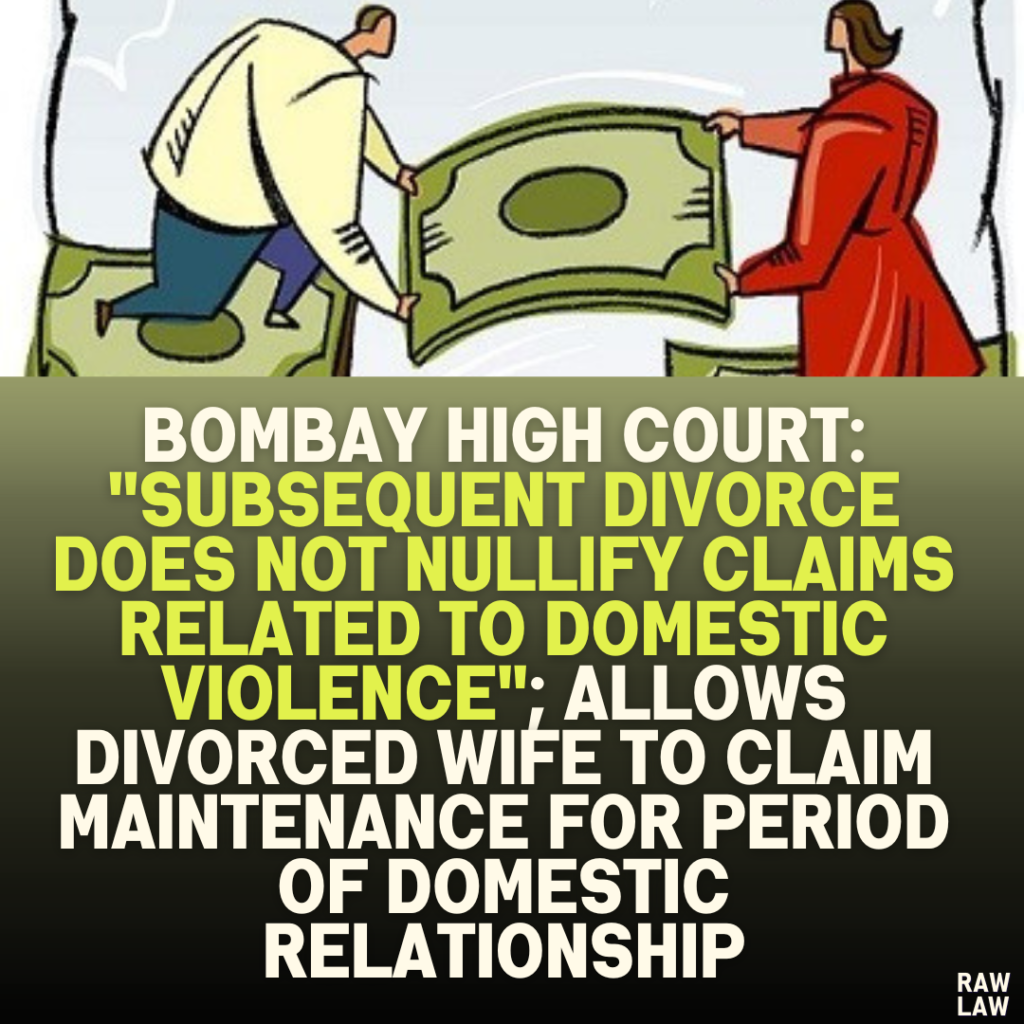Court’s Decision
The Bombay High Court, Nagpur Bench, dismissed a criminal revision application filed by a husband challenging the enhanced maintenance awarded to his divorced wife. The Court held that the provisions of the Protection of Women from Domestic Violence Act, 2005 (PWDV Act), allow a divorced wife to claim maintenance if the claims pertain to a period during which a domestic relationship existed. This decision aligns with authoritative precedents established by the Supreme Court, particularly in Prabha Tyagi v. Kamlesh Devi and V. D. Bhanot v. Savita Bhanot.
The High Court found no error in the appellate court’s decision to enhance the maintenance from ₹1,500 to ₹3,000 per month.
Facts
- Marriage and Separation: The applicant (husband) and non-applicant (wife) married in 2005. The wife left the husband’s residence in 2009 and began living with her parents.
- Legal Actions:
- In 2012, the wife filed a case under the PWDV Act for maintenance and other reliefs.
- Simultaneously, she sought divorce under Section 13 of the Hindu Marriage Act, 1955.
- In 2014, the Civil Judge Senior Division granted her divorce.
- Maintenance Proceedings:
- The trial court, in 2014, awarded the wife ₹1,500 per month as maintenance under the PWDV Act, effective from 2012.
- Dissatisfied, the wife appealed, and the appellate court enhanced the maintenance to ₹3,000 per month in 2021.
- Revision Application: The husband contested the enhanced maintenance, arguing that the wife, being divorced, was ineligible for relief under the PWDV Act as the domestic relationship had ceased.
Issues
- Can a divorced wife claim maintenance under the PWDV Act?
- Is a subsisting domestic relationship mandatory at the time of filing a PWDV Act claim?
- Does the scope of domestic violence under the PWDV Act extend to instances occurring during the domestic relationship, despite subsequent divorce?
Petitioner’s Arguments
- Disqualification Post-Divorce: The husband argued that the absence of a domestic relationship post-2009, coupled with the divorce granted in 2014, rendered the wife ineligible for relief under the PWDV Act.
- Legal Precedent Cited: He relied on the Bombay High Court’s decision in Sadhana Hemant Walwatkar v. Hemant Shalikramji Walwatkar, which held that a subsisting domestic relationship is essential for relief under the PWDV Act.
Respondent’s Arguments
- Claims Linked to Domestic Relationship: The wife argued that her claim was based on acts of domestic violence experienced during the subsistence of the marriage.
- Relief for Divorced Women: She emphasized that the PWDV Act’s protections extend to divorced women if their claims are connected to the period of the domestic relationship.
- Supreme Court Rulings: She cited Prabha Tyagi v. Kamlesh Devi, where the Supreme Court held that the Act’s provisions are available to divorced women under specific conditions.
Analysis of the Law
- PWDV Act’s Definition of Domestic Relationship:
- The Act defines “domestic relationship” as one where the parties live together in a shared household, connected by marriage, consanguinity, or a relationship in the nature of marriage.
- The Act’s intent is remedial, aimed at protecting women from abuse irrespective of marital status at the time of filing.
- Key Precedents:
- Supreme Court in Prabha Tyagi:
- Relief under the PWDV Act is available to a divorced wife if claims pertain to domestic violence experienced during the period of domestic relationship.
- A subsisting domestic relationship at the time of filing is not mandatory.
- Supreme Court in V. D. Bhanot:
- A decree of divorce does not absolve the respondent from liabilities arising from acts of domestic violence committed during the marriage.
- Supreme Court in Prabha Tyagi:
- Distinction from Sadhana Hemant Walwatkar:
- The High Court clarified that the earlier decision in Sadhana Hemant Walwatkar was overridden by the Supreme Court’s rulings in Prabha Tyagi and V. D. Bhanot, which have binding authority.
Precedent Analysis
- Prabha Tyagi v. Kamlesh Devi:
- Recognized the right of divorced women to claim relief under the PWDV Act for violence connected to the domestic relationship.
- V. D. Bhanot v. Savita Bhanot:
- Affirmed that domestic violence claims are maintainable even after the dissolution of marriage if linked to past acts of violence.
- Sadhana Hemant Walwatkar v. Hemant Shalikramji Walwatkar:
- Distinguished as it did not consider the broader scope of the PWDV Act elucidated by the Supreme Court.
Court’s Reasoning
- The Court observed that:
- The appellate court had rightly considered the wife’s entitlement to maintenance under the PWDV Act.
- The definition of domestic violence under the Act encompasses acts committed during the marriage, making subsequent divorce irrelevant to such claims.
- Supreme Court precedents firmly establish that relief under the PWDV Act extends to divorced women, provided the claims relate to the period of domestic relationship.
Conclusion
The High Court dismissed the husband’s revision application and upheld the enhanced maintenance of ₹3,000 per month. It affirmed that:
- The PWDV Act’s provisions are intended to provide comprehensive protection to women from domestic violence, irrespective of marital status at the time of filing.
- Claims connected to a domestic relationship cannot be nullified by a subsequent divorce.
Implications
- Strengthening Women’s Rights: This judgment reinforces the remedial nature of the PWDV Act, ensuring that women subjected to domestic violence during marriage retain their rights to claim relief even after divorce.
- Binding Precedents: The decision underscores the significance of adhering to Supreme Court rulings on the broader interpretation of the PWDV Act.
- Deterrence Against Abuse: The ruling sends a strong message that domestic violence claims will not be dismissed merely on technical grounds such as marital status.




Pingback: Delhi High Court Acquits Appellant in Burning Case: "Critical Discrepancies in Dying Declarations and Lack of Corroborative Evidence Undermine Conviction" - Raw Law
Pingback: Delhi High Court Upholds Labour Court's Award: "Charitable Trust Not an Industry Under Section 2(j) of the Industrial Disputes Act" – Petitioner’s Claim of Full-Time Employment Since 1995 Rejected - Raw Law